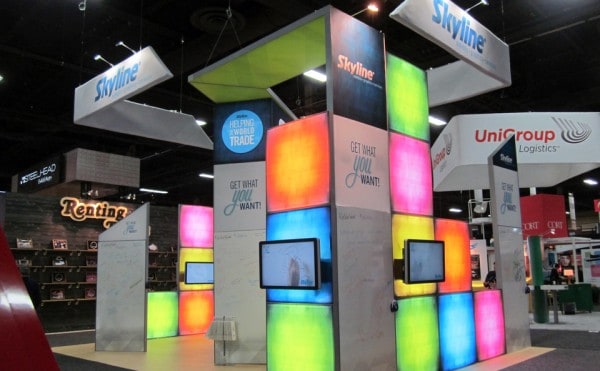Written by Chris Rowe, Skyline Displays Midwest.
As companies are consolidating roles left and right, the responsibilities of the Trade Show Manager are often passed to Marketing Coordinators, Generalists and Sales Managers. If you are someone who has had a company’s trade show program added to your already full plate, you may be feeling a bit overwhelmed. Here are five things to keep in mind as you’re running your trade show program.
KNOW WHERE YOUR MONEY IS GOING
When your boss says “Get me a trade show booth for that show and don’t spend more than X”, what does she mean? It is no secret that trade shows are expensive endeavors. Designing and building the booth is often only a small portion of the total cost of doing a show. Securing a spot at the show is at the top of the list for expenses. Shipping costs and drayage (getting your exhibit from your carrier to your booth and back) are costs that are very dependent on the weight of your booth. Install and Dismantle costs should be considered if your booth is not a Do-It-Yourself solution. Remember that in some markets your hanging sign is required to be assembled by the local union. Other trade show expenses include electrical, internet access, lead capture and carpet rental not to mention hotel accommodations, flights and meals. By considering all these costs when planning a show, you (and your boss) won’t be surprised when the bill comes.
GIVE YOURSELF TIME
There is nothing worse than trying to rush through a project – especially one with a lot of moving parts. Often there are deadlines for your show months before the show floor opens. Being timely can ensure that you get the best spot on the show floor, you’re taking advantage of all available early bird prices and you can snag the best rates for your hotel.
PREPARE FOR THE SHOW
The days of going to a show and expecting to sop up leads from the crowd are gone. You and your sales team should be spending the weeks leading up to the show reaching out to prospects and clients to schedule that face time for the show. Plan to get to the show with several meetings already on the books. This is the time to utilize your social media skills and tell everyone who will listen about the details of your show. Don’t forget to include the show’s hashtags so you appear on searches people do when preparing for the show.
BE ENGAGING
If you will be on the show floor this is critical. The show floor is not the place to check your emails (if you must, its best to step away from the booth). As much as you’re able, try to be on your feet interacting with guests in your booth. Resist the urge to let guests pass through your booth to collect their swag without connecting with them. Of course, there will be opportunities missed but limiting them as best as possible is the single easiest way to get a higher return on your trade show.
COLLECT DATA
The only thing worse than a poor performance at a show is not knowing how you did at all. It’s impossible to adjust to improve your show if you can’t identify the problems. “Was the show worth it?” questions become much easier to answer if you’ve captured leads and can answer confidently how much money you made from the connections the show facilitated.
Qualitative data is also important. Be prepared to observe traffic flow in your booth – which direction are people coming from? What parts of the booth do they pause at? For larger booths, do you notice any dead zones where a visitor cannot see any relevant information? These observations will help to inform how you adjust your booth for your future shows.
About the Author
Chris Rowe is an Exhibiting Consultant with Skyline Displays Midwest, a full service global exhibit, event and environments studio located in Minneapolis, Minnesota. A graduate of St. John’s University in Collegeville, MN, Chris is passionate about helping people, and he makes his client’s goals, problems and aspirations his own. His career in theatre has taught him that often the best solution to a complicated problem is the simplest one. He has made a career in communicating thoughts, concepts and ideas to his clients and there is no better education for that than being on stage. Chris believes that trade shows are performances at their core – put on a good show and the word will spread!
Catch up on more exhibition tips on Skyline’s blog.









